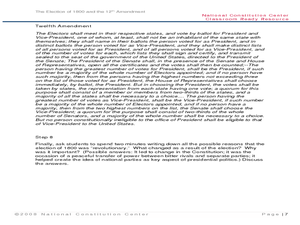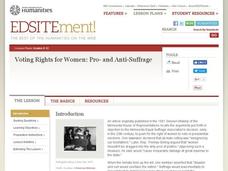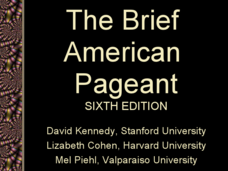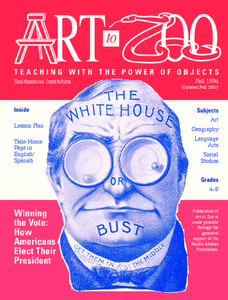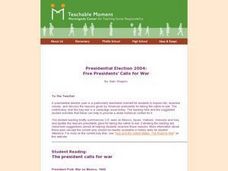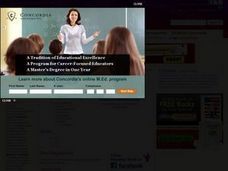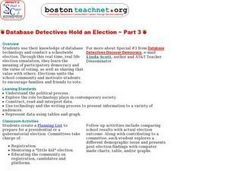Curated OER
Understanding the Election of 1800 and the Twelfth Amendment
Eleventh graders examine the election of 1800. In this American Government lesson, 11th graders summarize the events that made the election controversial. Students advocate for a candidate during a short role playing session.
Curated OER
Cartoons for the Classroom: The Veepstakes!
Take a step back in time with this political cartoon analysis worksheet, which features editorial cartoons from the 2008 presidential campaign. Background information allows pupils to "read between the lines" in their analysis, and three...
Curated OER
Voting Rights for Women: Pro- and Anti-Suffrage
Students examine the arguments for and against suffrage for women in the 19th and early 20th centuries. They explore various websites, read and discuss primary source documents, develop a document from two points of view, and analyze...
Curated OER
The Brief American Pageant: Twenty-Three Political Paralysis in the Gilded Age
Detailing the Presidential elections of 1876, 1884, and 1892, this slideshow focuses on the final years of the 19th century in the United States. Additionally, slides include information on the changes in Southern plantations and growth...
Curated OER
The Brief American Pageant: The Second War for Independence and the Upsurge of Nationalism
Use this series of bright, informative maps to illustrate important events of America's infancy. Detailing the Missouri Compromise, the Battle of New Orleans, and the Presidential Election of 1812, this presentation would be a good...
Curated OER
Making Informed Decisions
Students discuss various issues of importance in the 1998 congressional and gubernatorial elections, create comparison charts of their states' candidates' positions on these issues, and decide which candidate they would vote for based on...
Curated OER
Preserving and Promoting Democracy
Eleventh graders create surveys to determine whether or not young people have or plan to vote. Using their findings, 11th graders make advertisements aimed at encouraging youth to vote.
Curated OER
The White House or Bust: How Americans Elect Their President
Students explain the presidential duties and who is eligible to run for president. In this The White House or Bust article, students complete a map of the electoral college. In addition students analyze historical campaign posters....
Curated OER
Presidential Election 2004: Five Presidents' Calls for War
Students examine five president's reasons for entering into a war. Using the text, they answer questions and discuss their answers with the class. They also examine President Bush's reasons for going to war in Iraq and how that...
Curated OER
The Times, Are They A-Changing?
Students read and discuss article, "We Agreed to Agree, and Forgot to Notice," participate in anonymous mock presidential primary ballot, and share reactions to Iowa caucus results. Students then collect statements made by candidates on...
ProCon
Electoral College
The Electoral College's role in elections is sometimes confusing and controversial. Pupils use a debate topics website to research the pros and cons of the practice to debate whether the United States should still use the Electoral...
Museum of the Moving Image
Political Ads in Historical Context
Campaign ads target both timely issues and general themes. Presidential campaign ads from 1952 and 1988 provide class members an opportunity to compare how the topics ads choose to address can dramatically influence election outcomes.
Curated OER
How Laws Are Made
Students create a graphic organizer to illustrate the steps elected representatives must take to make a new law. Included: Student work sheet and role-play ideas. Students use their graphic organizers to write a paragraph briefly...
Curated OER
Political Campaign Ads
During a political campaign, you can hardly turn around without encountering an endorsement or attack on a candidate. High schoolers examine the ways that negative advertisement, positive advertisements, and everything in between can...
Curated OER
NONVOTING: CHAPTER 6: SECTION 4: WORKSHEET
It is interesting to look at the election and voting process from a far. This activity does just that, your class will look at trends in voting populations and develop an understanding of the voting process. Please note this resource...
Curated OER
Evaluation of Election Process
Students examine the procedures to elect the President of the United States. In groups, they create their own political cartoon presenting a consensus of their point of views on the process. They identify the strengths and weaknesses...
Curated OER
Voting Time
In this math instructional activity, students solve 4 story problems pertaining to elections in the United States. Students will use all four math operations in these problems.
Curated OER
Presidents and the Constitution: George W. Bush and the Case of Bush v. Gore (2000)
Students examine the impact of court decisions. In this Supreme Court lesson, students read the Bush v. Gore case study regarding the presidential election of 2000. Students take notes on the case and respond to discussion questions...
Curated OER
Stand and Deliver
Young scholars take a closer look at the presidential election of 2004. In this American politics instructional activity, students visit selected websites to learn about the 2004 campaign and active citizenship. Young scholars then...
Curated OER
Primary Process in Elections
Students read "How Does the Primary Process Work" and complete the accompanying worksheet. They explore how the primary and caucus process works in small groups or in pairs. They answer questions based on the primary process to...
Curated OER
Database Detectives Hold an Election ~ Part 3
Students use a database to conduct a schoolwide election. They discover the importance of voting and democracy. They incourage one another to vote.
Curated OER
Elections for Elementary Students
Students explore various websites that explain how primaries, caucuses, and general elections function. They view sample ballots, and analyze the executive branch, U.S. presidents, and citizenship.
Curated OER
Candidate Debate; Making Informed Voting Decisions
Pupils study the concept of what it means to be an informed voter who makes conscientious voting decisions based on significant information. In this making informed voting decisions lesson plan, students are introduces to a unit on...
Classroom Law Project
How do we hire a President?
What are the job requirements for the office of president of the United States? What attributes should a candidate possess? Are the qualities needed to govern the same as those needed to win? What can an analysis of the management style...


